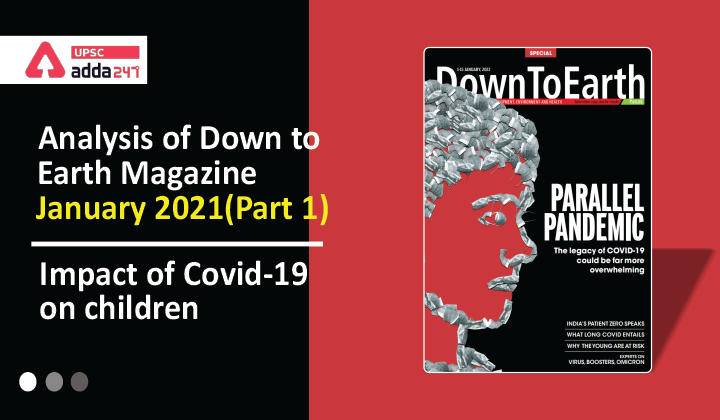Table of Contents
Context
COVID-19 is the biggest crisis for children in UNICEF’s 75-year history, reversing hard-won progress. Without action, the world faces a lost decade for children, leaving the Sustainable Development Goals an impossible dream.
Key Points
- In less than two years, 100 million more children have fallen into poverty, a 10 per cent increase since 2019.
- In a best-case scenario based on past trends, it will take seven to eight years to recover and return to pre-COVID child poverty levels.
- The deep disparity in recovery from the pandemic is widening the gap between richer and poorer countries.
- While richer countries are recovering, poorer countries are saddled with debt and development gains are falling behind. The poverty rate continues to rise in low-income countries and least developed countries.
Impact on Health
- A survey on long covid by UK researchers shows children can continue to experience the adverse effects of covid-19 even after three months.
- The percentage of post-covid-19 symptoms in children is more than that in adults, even though fewer children had symptomatic infections.
- According to various researches, some effects will only be evident much later.
- As Covid-19 minimised social interactions and incidentally, social distancing will not just slow down the circulation of covid-19 but also of other infectious agents, “depriving” children of building immunity to common ailments.
What is a multisystem inflammatory syndrome in children (mis-c) ?
- The occurrence of the multisystem inflammatory syndrome in children (mis-c) post covid-19 infection is a serious threat that needs attention.
- The exact cause for mis-c remains unknown, however, its effects can be devastating. For instance, many children earlier diagnosed with post-covid mis-c are still undergoing treatment due to a damaged mitral valve.
- Most children with mis-c develop coronary artery problems. If it enters the bloodstream, the condition can also cause a brain or pulmonary haemorrhage.
Impact on Psychological well being of Children
- Apart from physical side effects, the pandemic years have also led to behavioural changes in children.
- Near-complete isolation for more than two years has led them to display abnormal amounts of aggression, depression and fear.
- Lack of exercise and increased access to unhealthy food has also led to weight problems, further impacting their psychological well-being.
How Children’ Immune System is Different from Adults?
- While adults respond to the virus through an adaptive immune system (which humans acquire following disease exposure), children use their innate immune system (which they are born with).
- A study published in Nature Communications on April 1, 2021, suggests that adults have more cross-reactive antibodies targeted at parts of sars-cov-2 virus that were similar to bits of other coronaviruses, whereas children tended to produce a broader range of antibodies against all sections of the virus.
- But over the past two years, children’s innate immune system has been exposed to this virus, and they could be losing the advantage.
Impact on Social Life
- Changes in the lifestyle of children due to perceived contagion risks may result in long-term shifts in professional, social or mating preferences.
- For instance, mandatory use of masks and social distancing may result in future generations gaining limited social skills or poor ability to interpret facial non-verbal cues.
How Locking impacts the overall well being of Children?
- Doctors say the country must not close in person schools and colleges for a very long time, as locking children up in their homes leads to other long-term impacts.
- Lockdowns have increased sedentariness, screen time, stress, irregular mealtimes, consumption of less nutritious foods, and fewer opportunities for physical activity and recreational sports.
- As a result, there is an increased risk of overweight and obesity among children.
- In countries like India, where children were dependent on school meals, this also meant increased malnutrition.
- Some impacts are already being felt. For instance, education has suffered due to repeated disruptions and gross disparities in access to remote learning resources.
- As a result, children of today may not attain the same educational levels as their predecessors.
- In addition, the pandemic has accentuated gross socio-economic inequalities in the society. Like education, children belonging to higher socio-economic strata also had better access to crucial healthcare services.
Way Forward
- After being away from school and other activities for a long time, transitioning back to a routine will not come easy.
- They will need the help and guidance of teachers, parents and doctors as they return to the post-covid-19 world.
The trauma of losing close family members to covid-19 will also play a role. - There are already cases of children displaying heightened anxiety as they fear contracting and succumbing to the infection.
Moving forward, the point of focus now is the vaccination of children. - Today’s crises also present a unique window of opportunity for the world to reimagine itself – as a fair, safe, interdependent whole in which every child’s potential stands an equal chance of fulfilment.
Conclusion
Pandemics and other events are marked by uncertainty and anxiety. These are inevitably projected onto the future generations. However, at this point we can only speculate on the long term effects of covid-19 on children. The future generations and their ability to become resilient and thrive in the post-covid-19 era is predicated on the provision and allocation of adequate resources. Now is the time to reimagine and reinvent education, healthcare and social services to help future generations become successful adults.



 TSPSC Group 1 Question Paper 2024, Downl...
TSPSC Group 1 Question Paper 2024, Downl...
 TSPSC Group 1 Answer key 2024 Out, Downl...
TSPSC Group 1 Answer key 2024 Out, Downl...
 UPSC Prelims 2024 Question Paper, Downlo...
UPSC Prelims 2024 Question Paper, Downlo...
